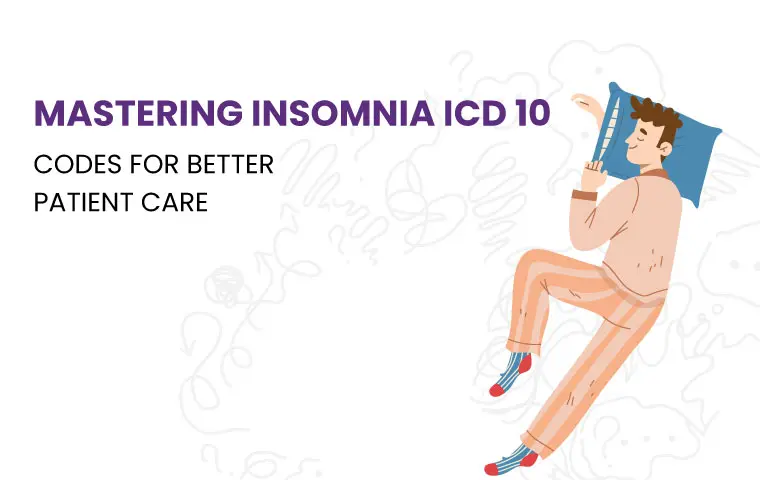Insomnia, one of the most common sleep disorders affecting millions worldwide, is characterized by difficulty falling, staying, or waking up too early. As a healthcare provider, you know how crucial it is to accurately diagnose and code this condition for effective patient care and insurance reimbursement.
That's where the ICD 10 code for insomnia comes into play. In this blog, we'll explore the different types of insomnia, coding guidelines, and the ICD 10 codes used for their classification. So, let's dive in and decode the insomnia diagnosis code together.
What is insomnia & its Types?
Insomnia is when a person finds it difficult to fall asleep, stay asleep, or wake up too early and cannot go back to sleep. It can be caused by psychological factors such as stress, anxiety, depression, or physical conditions such as chronic pain or endocrine problems like diabetes.
There are three types of insomnia- acute, chronic, and comorbid.
Acute insomnia is short-term and can last for a few days or weeks
Chronic insomnia lasts for more than three weeks
Comorbid insomnia is when the symptoms are associated with various mental health conditions such as depression, anxiety, PTSD, etc.
Symptoms of Insomnia
The primary symptom of insomnia is difficulty falling asleep, staying asleep, or waking up too early. Other symptoms may include:
- Trouble concentrating during the day
- Fatigue and low energy levels
- Irritability and mood swings
- Muscle aches
- Headaches
What is ICD 10 code for Insomnia?
When a patient comes for a visit, the healthcare provider must accurately diagnose their condition and assign the appropriate ICD 10 code. The most commonly used code for insomnia is G47.00. This is considered a billable code and can be used for reimbursement from health insurance companies.
ICD-9 Code Transition for Insomnia
The ICD-9 code for insomnia was 780.52. This code was used to classify patients with insomnia symptoms, including difficulty falling asleep or staying asleep, waking up too early, or experiencing non-restorative sleep.
However, with the transition to ICD-10 coding, the specificity of codes for sleep disorders, including insomnia, has improved. ICD-10 codes allow for greater specificity in coding based on the type of insomnia and the specific symptoms experienced by the patient.
While ICD-9 codes are no longer in use for billing and reimbursement purposes, healthcare providers may still refer to these codes for historical documentation purposes. However, it is important to note that ICD-10 codes should be used for accurate and current diagnosis and billing of sleep disorders such as insomnia.
Coding Guideline for Insomnia
The ICD-10-CM Manual provides detailed coding guidelines for insomnia, which can be found in Chapter 5 (Mental and Behavioral Disorders – Codes: F01-F99) and Chapter 6 (Diseases of the Nervous System – Codes: G00-G99). Healthcare providers must follow these guidelines to ensure accurate coding and billing for insomnia.
According to the guidelines outlined in Chapter 5, it is crucial to note exclude 2 notes to differentiate insomnia from other related conditions. This is because insomnia symptoms can be present in patients with other underlying medical or psychiatric conditions. Therefore, it is necessary to code these conditions separately to avoid confusion and ensure proper diagnosis and treatment
In addition, the guidelines emphasize the importance of a comprehensive clinical evaluation, including a detailed patient history, physical examination, and sleep diary, to accurately diagnose and code insomnia. Comorbid conditions such as depression or anxiety should also be documented and coded appropriately to provide a complete picture of the patient's condition.

Exclude 2 Notes
In ICD-10 coding for insomnia, certain "exclude 2" notes must be considered when selecting the appropriate code. These notes indicate that there are certain conditions in which insomnia may be present as a symptom but should not be coded as the primary diagnosis.
For example, one "exclude 2" note states that insomnia due to a mental disorder should not be coded as primary insomnia but rather as insomnia due to a mental disorder (F51.05). Similarly, insomnia due to a medical condition such as chronic pain or respiratory disorders should be coded as insomnia due to a medical condition (G47.00).
Considering these “exclude 2” notes when coding for insomnia is important to ensure accurate and appropriate coding. Failure to properly code for underlying medical or mental health conditions can impact reimbursement and result in inaccurate diagnosis and treatment.

Final Words
In conclusion, proper diagnosis and treatment of insomnia is crucial for patients, and ICD-10 codes play an important role in this process. By accurately identifying the appropriate ICD-10 codes for the specific disorder, healthcare providers can ensure that patients receive the best possible care and treatment, while also properly billing for services rendered. This, in turn, can help providers get properly reimbursed for their services while also improving the overall quality of care for patients with insomnia.
ABOUT AUTHOR

Steve Harrison
As a blog writer with years of experience in the healthcare industry, I have got what it takes to write well researched content that adds value for the audience. I am a curious individual by nature, driven by passion and I translate that into my writings. I aspire to be among the leading content writers in the world.
